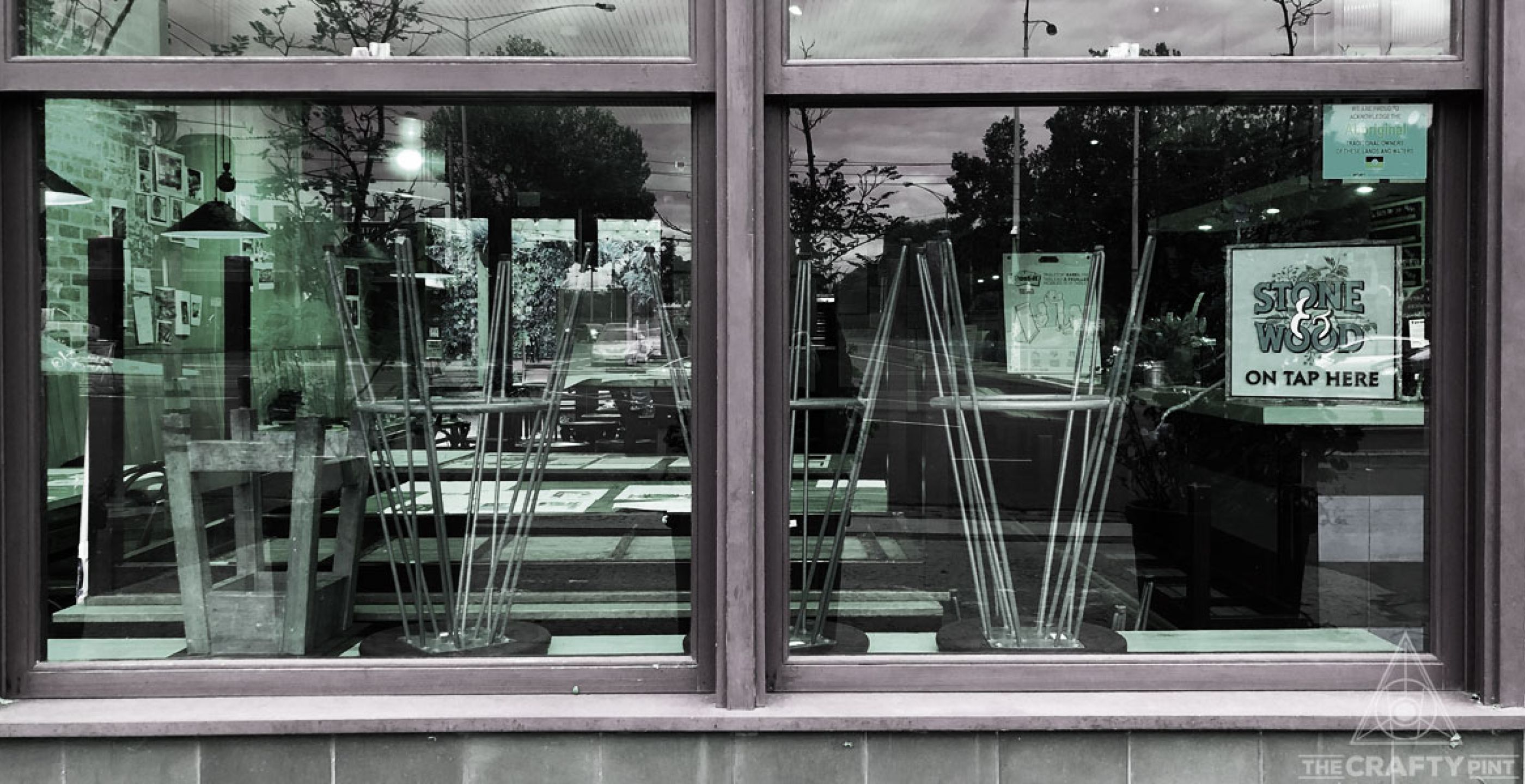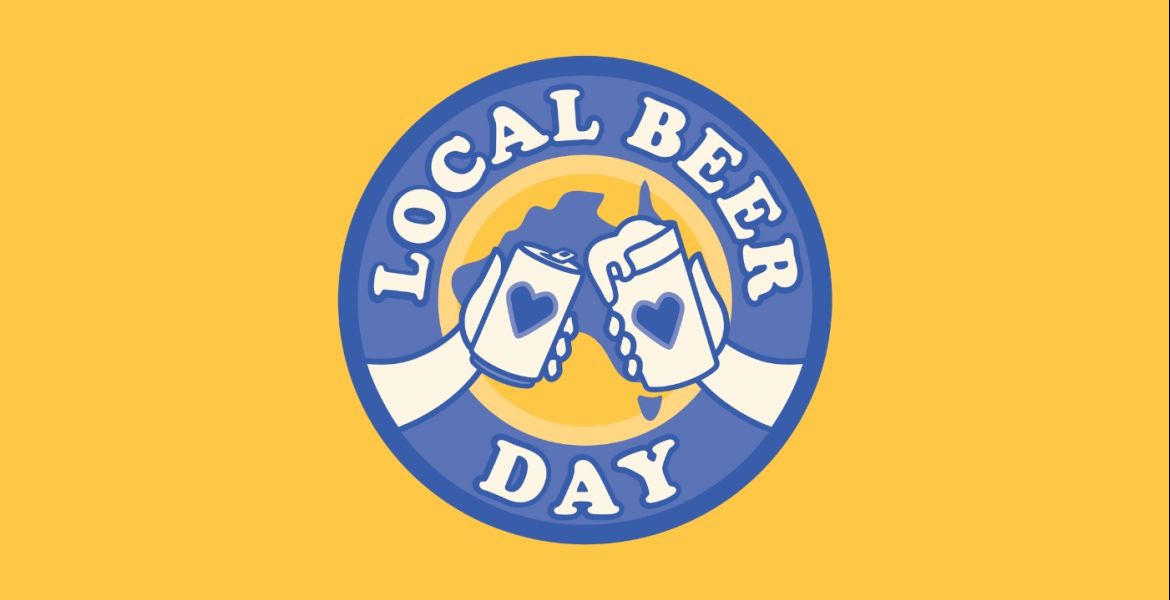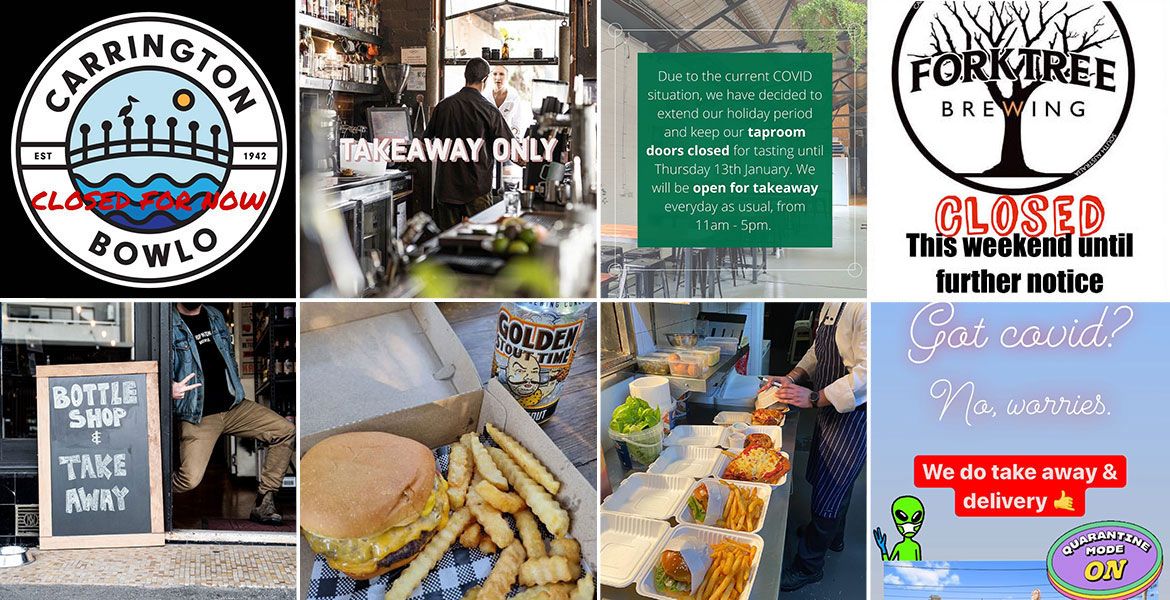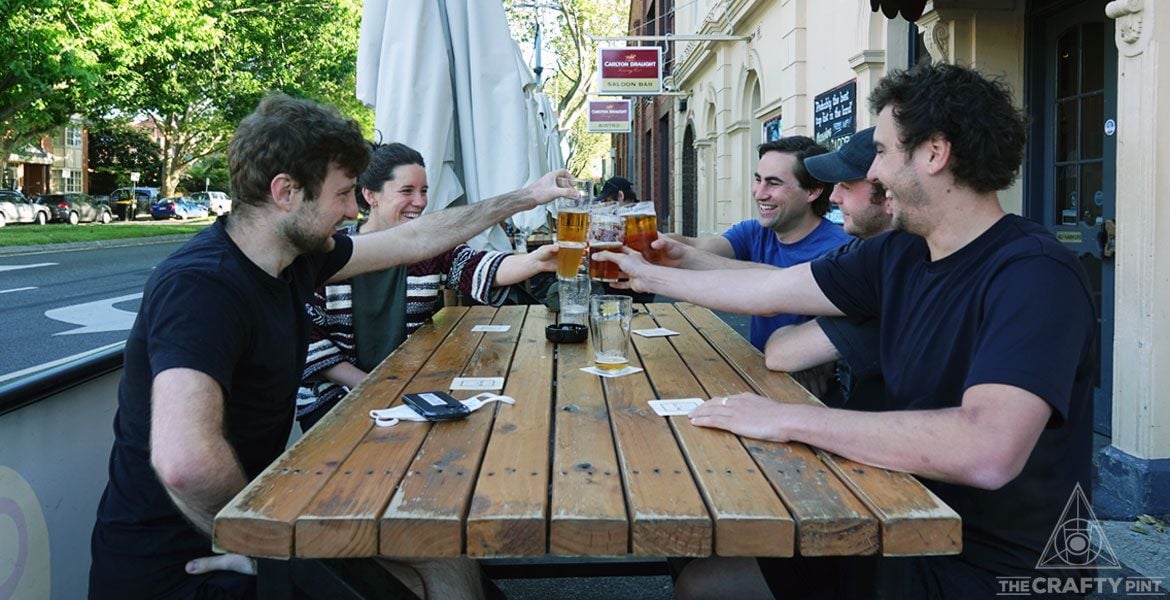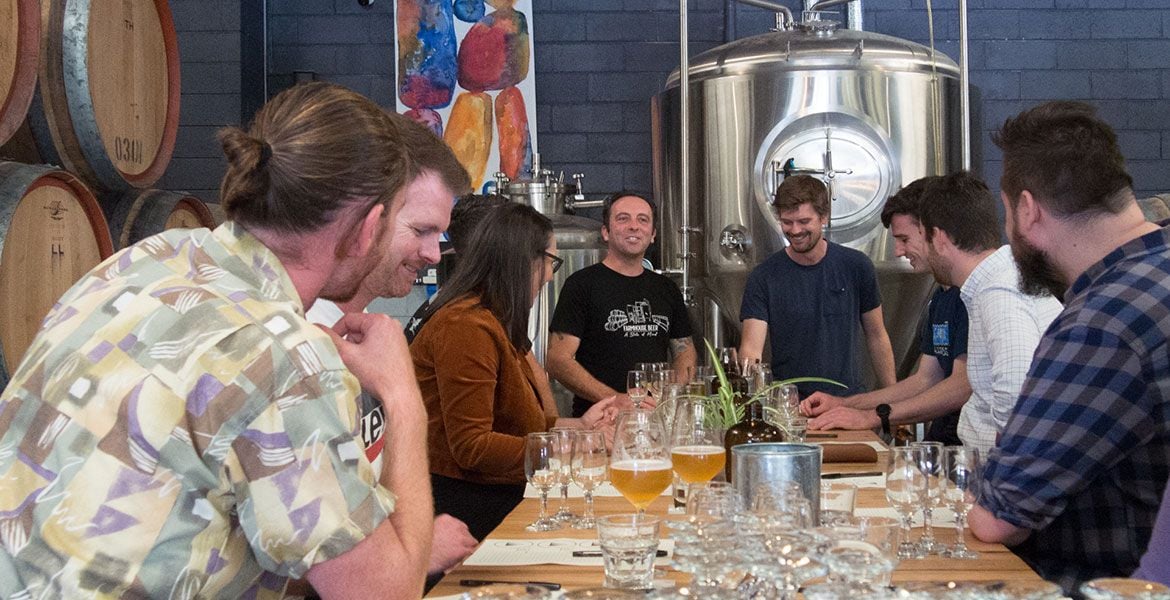The ability of time seemingly to bend, stretch, shrink and contort has been well documented over the past few weeks, ever since the reality of what life during the COVID-19 pandemic would mean became apparent. For some it might feel like months or years have passed, to others like it was last week, yet today marks just 50 days since the historic moment the nation's pubs, bars, taprooms, restaurants and cafés were closed.
The many and varied ways in which the local beer community has innovated as people try to survive until we return to some form of normality have been well documented, including through the #keepinglocalalive campaign and our Postcards from the Edge series. But, as some states and territories look towards the easing of restrictions, what is the scale of the damage wrought to date and just how will the beer world look at the other end?
For now, the majority of beer businesses are in hibernation or have adapted their models and are retaining staff on reduced hours with JobKeeper support. Some owners, however, have already made the decision to close, including some well known businesses: The Flying Scotsman and its associated venues in Perth, the Kings Head in Adelaide, for example.
When it comes to the country's brewers, the results of a survey by the Independent Brewers Association published last month paint a bleak picture, with overall sales at the time down by an average 69 percent. Respondents also revealed overall payroll had been cut by 46 percent in response to tighter restrictions, with 61 percent indicating that without additional Government assistance their business would struggle to make it beyond the end of the pandemic.
As we reach the 50 days of shutdown mark, what seems certain is that a return to the way we socialised in February is a long way off; some fear it may never return in full. And the partial easing of restrictions upon venues announced in recent days for some parts of the country represent the tiniest of steps. As Victorian Premier Dan Andrews said in his statement today, allowing businesses to serve up to ten patrons makes it "hard to be viable".
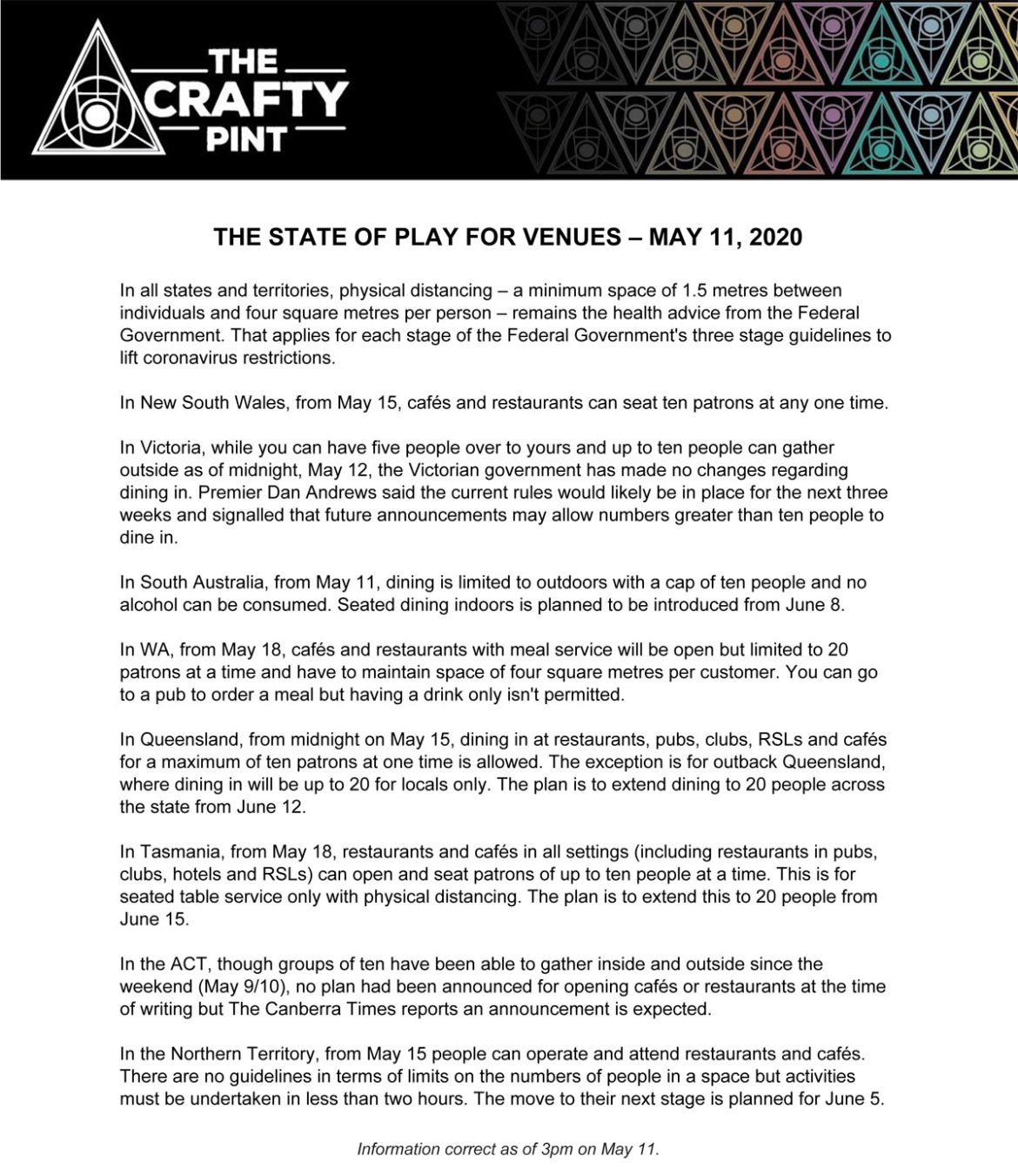
In Queensland, where from May 15 dining in at restaurants, pubs, clubs, RSLs and cafés for a maximum of ten patrons is allowed (up to 20 in outback regions), David Kitchen, owner of Ballistic's two brewery venues and their West End Alehouse & Kitchen, says they won't be reopening but instead working on upgrades to their venues and servicing their locals in other ways.
"Besides the simple economics of trying to run a kitchen for just ten people at a time, we are concerned having large venues open for ten people would provide a very ordinary experience," he says "We aim to provide world-class beer experiences and having to rotate customers through the venues, kicking them out after a certain time so we can get more in, having one or two tables in a large dining area, and so on will not provide those experiences."
For Luke Hiscox at the Union Hotel in Newtown, the situation remains very much one of uncertainty. For their large, multi-space pub, the ability to open for up to ten people from Friday as per the new guidelines for New South Wales changes nothing, but he can see benefits for small bars and cafés or restaurants who can make it work financially.
"We’ve done the sums for our situation and it doesn’t work," he says. "It’s not that we’re ungrateful for the new option, it’s just that we’d likely run at a further loss than we are now.
"From the conversations I’ve had with the other operators and business owners, it sounds like it’s the same problem everywhere."
The proposed Stage 2 level of 20 customers may work, but he says it would depend on how their customers respond and how they could deliver a safe environment. As with so much, uncertainty reigns.
"Would we reopen the Front Bar? Would we go for the restaurant space so it’s more family friendly? Will parents even bring kids to the pub in the first few months back?" Luke says. "I’m not alone in considering that, to start with, we may not go back to trading seven days a week in the bar. Everyone will be having a close look at what’s feasible. Do their pre-Covid trading hours still make sense?"
Add in just how the industry will look post-pandemic – and post-JobKeeper, for that matter, which Luke describes as "a life raft in this storm" – and plenty more innovation and an ongoing will to dig deep will still be required. And that's without considering the possibility of a second shutdown should cases rise again.
"It’s certainly promising to see restrictions being relaxed across the country, but we still have a long way to go," IBA chair Pete Philip says. "Many places cannot operate viably with ten-person restrictions, so the loss of revenue from draught sales is still significant.
"Government assistance is essential for our members to come out of this on the other side, which is why we’re asking for excise relief."
To mark 50 days since the nationwide closure, we approached people occupying different roles in the local craft beer economy to find out how they've been impacted and where they think we're headed.
The Brewery Owner
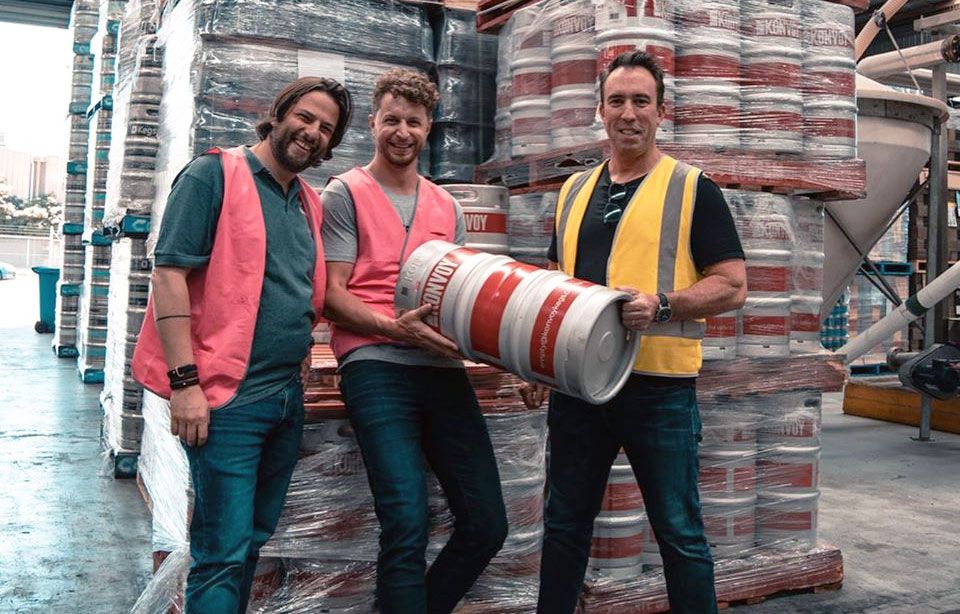
The craziest thing just happened in Lebanon [where Mazen grew up and launched his first brewery]. They had tighter controls on coronavirus than Australia and had completely nailed it. Then they started flying expats back and told them they didn't have to stay in a hotel. Some guy went back to his village and infected so many people cases are on the rise again and they've reimposed the curfew.
That’s my big concern with reopening. We’ve done the hard yards.
In Australia, we haven't really seen the pandemic hit us. In New York City, it's one in every 500 people dead; I don't know anyone in Australia who knows anyone who's had it, so I don't think people have really grasped what it means. Was it our decision to lock borders early or the fact we're so isolated or because it was summer and that wasn't conducive [to the spread]? I don't know but I wouldn't want to be the one to bet on this race.
I'm not even sure the lockdown continuing for a long period will change the results; whether we just accept this is part of life now or find a cure or something else.
I know JobKeeper is crack cocaine right now for a lot of people and keeping businesses alive but it’s masking the bigger problems we’re going to have later on. I really don't know but I'm worried there's a lot of complacency in the market right now – a false sense of security because of JobKeeper. It just delays the stress.
Consumers have changed their consumption habits: our willingness to socialise with strangers is vastly diminished and even if bars do reopen it's with restrictions and there will be a reduced number of bars reopening. We’ll come out of the gate, then JobKeeper disappears and then everybody starts piling money back into suppliers to produce more beer to service the market, but I’m worried that the market won’t be there and it all comes back pear-shaped.
Brewers don't have to pay a lot of people now but when they come out the other end, if 50 percent of the bars aren't there and they're staffed to a level that doesn't exist anymore, they're either going to have to pay redundancies or put people back on full salaries.
Consumers have been eating into their savings and even if they come out and have a job incomes will be down [for many] and we have to consider the mental health of people coming out of this. People will have lived through very stressful times. I’ve lived through two civil wars but never through anything like this. I feel distanced from my family, my mother who is at risk, my son. I feel sorry for the poor bastards behind the checkouts at supermarkets having to serve these angry, irrational people.
At Hawkers, we've seen a spike in demand for Rover, showing people have gone for value. With Hawkers we saw a massive spike in online sales which eased off a bit later but is still way more than pre-COVID. So we're repositioning ourselves for more direct to consumer sales – our drive-thru is open on weekends now – but that's a fine balancing act because we don't want to tilt the model too far; ultimately, when we come out the other side we want to be able to reengage with our partners. It will be a much harder place if bars and bottleshops don't make it.
There will be vultures out there thinking of the long game, knowing there will be a lot of bargains as businesses close and that at some point humanity will cure it or develop some sort of immunity or learn to live with it. Long term, a lot of locations will come up for lease or sale that would have been safely tucked away before this.
At Hawkers, we are going to be focusing much more on our backyard. You can react quicker to defend your business if there is a shutdown again. You are minimising third party costs and know everyone on a first name basis. There will be a bit more focus on Rover as pricing is definitely going to change in the market.
Mazen Hajjar is a co-founder and CEO of Hawkers Beer.
The Venue Owner

To say there have been challenges for our hospitality industry over the past few weeks would be an understatement. We condensed our food offering for restaurant takeaway the day after mandatory closure and, having a general liquor license, we could also sell takeaway beverages. Overnight, we remodelled one of our entrances into a takeaway window and bottleshop.
We consider ourselves truly fortunate to be able to adapt our business in this new environment. This was not the case for a lot of our local community; so many of our friends found themselves unable to trade in any capacity and it was devastating. It was incredibly difficult for anyone to remain optimistic. Our only strategy was to just take it a day at a time.
The knock-on effect for our brewing friends around Tasmania was sobering. Cool rooms filled with kegs, looking to be discarded with no other option was heartbreaking to say the least. For us, this was a motivator to figure out a way to tie us all together again. Easier said than done when you are trying to remain financially vigilant and do what feels right for your community – but we would not have had it any other way. The community support for us and for the legends who brew/make wine/grow vegetables has been incredible. Silver linings, you could say.
What we have seen is a sense of camaraderie between local brewers: coming together to figure out how they can collaborate to sell mixed packs of cans to bottleshops and those still trading, the creation of an Isolation Beer Festival to keep local alive and support Tasmanian indie beer for us was so inspiring and completely embraced by our customers.
Since the announcement [that restaurants and cafés can open for up to ten people from May 18 in Tasmania], we are optimistic that we can get some tap beer flowing sooner rather than later. We acquired some growlers a few weeks back, so we are hoping to keep that going moving forward. We have also been offering mixed Tasmanian six-packs of cans to keep our customers engaged in what is on offer locally, potentially trying new brews that they may not be familiar with. We want to keep that going as well.
When days feel like weeks, our idea of how things will pan out is constantly evolving. Our right-now-plan is to focus on building this takeaway aspect of our business. By putting these things in place, we hope to be better prepared for the future if the road takes another adventurous turn. If we can gradually open up in some capacity over the next couple of months, we are trying to see it as an opportunity to give the building new life.
We hope that we can have our beloved community come back through those doors and join us in the bar once again. We really miss everything about hospo life: the conversations and the services. The first beer sitting at the bar will be a really good one, no doubt about it.
[Looking ahead] it is hard to imagine a craft beer industry with mountains of kegs and less packaged product anymore. Much like us, I think most would prepare for the potential of a similar event occurring again.
The COVID effect took one week to shut down our entire industry. In light of this, I know that we will be keeping packaged product around, and takeaway available, and I would assume brewers will be seeing the same. The future is more canning equipment in operation, more local packaged product available on premise and retail, and the freshest keg brews there ever were – but in smaller quantities. A little friendly rivalry amongst bars never hurts, just gotta be quick to get the best kegs!
What I can say for sure is that there has been an overwhelming amount of support, compassion, friendship and kindness in Tassie. I am sure the craft scene around us are feeling the love as much as we are.
Whitney Ball is one of the owners of Tom McHugo's in Hobart.
The Beer Lover
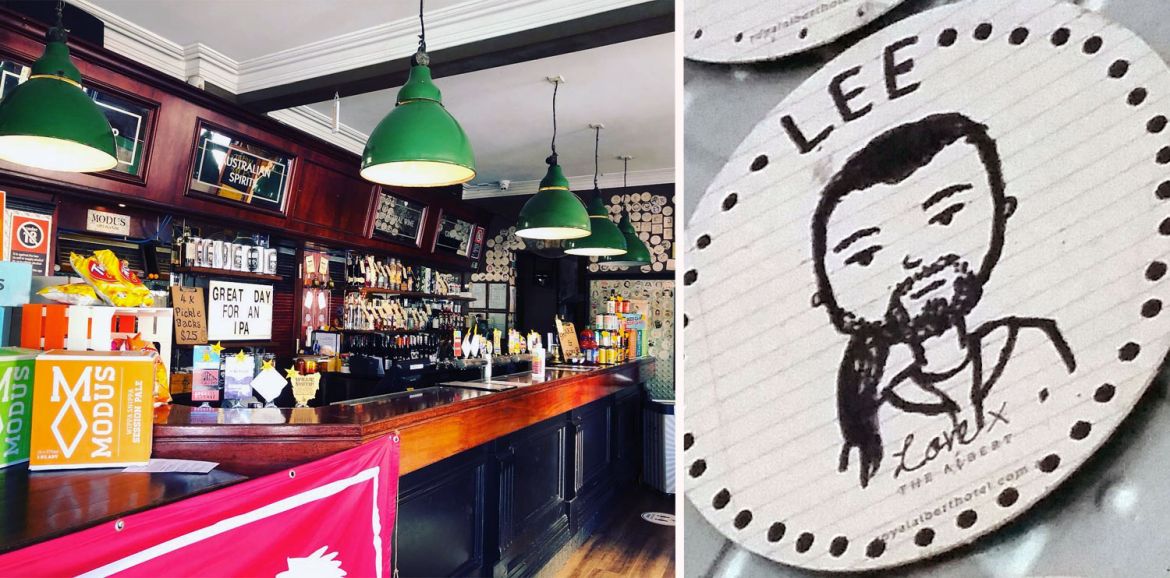
I’m a beer-enjoying punter who feels a great appreciation for the local beer industry. It’s more than a conduit to drinking beer: it’s the sense of community and inclusiveness – all of which have provided great opportunities over the years in ways I could not have envisaged.
From disrupted routines, lack of exercise – walking to the pub is my only real form of exercise, to the general shock caused by COVID-19, there has also risen an uncharacteristically positive outlook from it all. The on-premise lockdowns have given me pause for thought to recollect the true value that venues have in the community.
It’s somewhat cliché but it really is the “Cheers” effect: having a place where people can go, whether it’s to meet up with friends or an impromptu stop-off, all whilst feeling comfortable regardless, can provide immeasurable mental benefits. And it’s not just the punters’ side of the bar that contributes to this. The venues that I frequent have quality, well maintained beer but also it’s about the staff that work there, all of whom I consider friends. I’ve never been complacent about having these venues available but the current situation helps to reinforce this concept and I look forward to when we get out on the other side.
I’ve been using the lockdown to support my local venues/breweries that have been impacted as best I can, like many across the scene, and it has also been an opportunity to actively seek out beers from breweries I may have not sampled before along with revisiting styles/breweries that I have not consumed for some time.
I think where I live the impact has been one of reservation, reevaluation, and reinvention.
The lockdowns have not been easy for venue owners and their staff. However, all through this situation, they have shown that they are not “just” business owners capable of adapting to new situations but also contributors to the industry as a whole: from working together to share resources while each are still finding their new rhythm, to setting up initiatives to ensure breweries' beer doesn't lay fallow, to doing what they can to take on staff who have lost their positions at other venues.
With regards to punters, there’s the increase in social media and virtual meetups to stay connected, and it’s encouraging to see so many doing what they can to support the local businesses whether that's by purchasing from them, or indirectly by promoting on social media platforms.
By its social nature, this industry will probably be one of the last ones to have its rules relaxed so [the look of the craft beer scene post-COVID] is a difficult one to predict as no-one really knows how long this will go on for. However, once out of it, I feel as though there will be an initial sense of trepidation, hopefully combined with a positive resilience going forward.
Every day I see many positive contributions from people – within and outside of the industry – to rally together. Long may this continue on the other side.
Lee Webb is (or at least was) a familiar face at Sydney's best beer venues. You can find him online here.
The Sales Rep
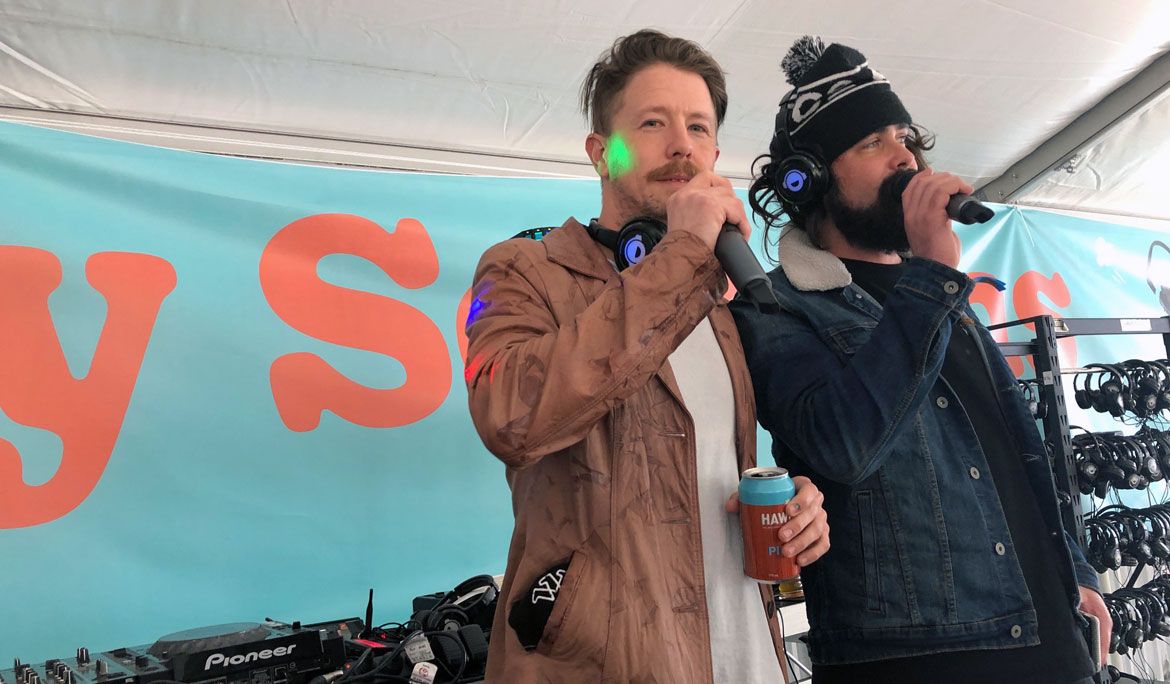
From the get go, we knew it wasn't going to be good. I'm currently on JobKeeper, which is better than JobSeeker. Nearly 75 percent of our off premises accounts advised us no reps were allowed in the store, and, of course, there are no pubs. We moved to emails and phone calls as the norm.
The impact been on the WA beer community has been immense, particularly on smaller breweries. The loss of kegs overnight and many bars asking for kegs to be credited was crippling for brewers, as breweries strive for taps [and] some had keg sales as 50 percent of their business. We have seen the rise of direct to customer brewery supply, and possibly the most small batch brews being released at any given time, as we all scramble to reduce the loss.
Breweries were poised to be selling kegs direct to public, but that was squashed in WA with the restrictions on alcohol sales.
The best case scenario is we will be back in bars by spring to be enjoying a few froths in the sun. The reality is many of my mates have lost their jobs, had to access super, paused mortgage repayments, and some face losing their business. I just hope as few people lose their life savings as possible and, as soon as we can, people get back to supporting their brewery with a pub lunch and froths, supporting their local favourite bar with a pub lunch and some froths. Don't hold a BBQ, go to the pub!
Local guys here have adapted by making bare bones beers, to try to further develop the drink local, drink independent movement and obtain market creep from the everyday lagers. I think this is a sound strategy and one we will see replicated, like we did with the rise of crispy bois: let's get the everyman on the independent beers.
Further to that, whilst everyone has been sitting at home, many people's consumption has sky rocketed and, to counter that, alcohol free options are on the rise. I personally love to consume these on my AFDs, and I think there's a gap in the market there.
Tim Hoskins is a Perth-based rep for Colonial who's been involved in the WA beer scene for many years in many ways.
The Importer / Distributor

Being an importer means orders are placed up to two months in advance from the breweries we support. And what felt like almost an overnight pandemic meant we had several shipments already on the water to Australia with no way of amending our orders. With lots of beer about to land and no one to sell it too, we were in a bit of trouble. This meant we had to figure out something – fast!
We knew it would be a hard sell when your portfolio consists of some of the world's top ranking beer, which comes at a certain price, to venues who also have no way of knowing if they could keep selling, or earlier on if they could even stay open. These uncertainties heavily impacted us as we had the beer cold and ready to go with possibly no one to sell to.
Our small, close-knit team of three quickly adapted to suddenly working apart and via social streams to get the daily tasks done, which I think has brought us even closer as a team.
We opened a direct to public portal for our beers – for the first time in nine years of Northdown, we gave public access to our beer menu on a website that pretty much was set up overnight. No glitz and glam about it. This helped to move some stock and eased a little pressure to pay immediate bills. We can't thank our friends and family more for helping us spread the word about it.
Luckily, the bottleshops and newly adapted "takeaway option" venues that have been big supporters of ours have become our saving grace and have kept us afloat with their support, their understanding and, of course, their beer orders! We can't thank them enough for their continued support.
We were pretty much forced to heavily discount almost all the beers to help move them, most below cost price, as it costs us a fair amount to keep the space and cold refrigerated at all times. And we have to pay the breweries on time, too, to ensure their survival, so if you ever wanted to get onto some Northdown beers, now is the time!
In the short term, we hope to move kegs and I cannot wait to go visit our customers, to just talk about sweet nothings and share in our love of delicious crafty beer.
Long term, we hope to see the breweries that we have in our portfolio still be there after this as they are all independent breweries with teams starting as small as just two people. Most have been with us since day one of Northdown so we have really got to know the families and the teams behind the scenes that make such amazing beers.
With the majority of our beers coming from small, family-run breweries abroad, it has been hard or rather unclear if their country's restrictions will allow them to make it to the other side. This uncertainty is stressful for us as we want to keep supporting them as we have been for years but all we can do is hope they will survive so that we can keep sharing their beers with Australians.
Also, I hope to still have a Northdown on the other side of this as I love my job to the point that it's become so integrated with my life I can't tell what is work and what is play!
One thing I have definitely seen in the craft beer scene is a massive positive change in people’s attitudes and in social media spaces to support small business. I think a majority of the public has realised the importance of supporting small business as these are the guys that, if you don't support them, they will just no longer be there. Plain and simple.
I think the massive pivot venues have made has really rallied people to help. I've seen a lot people go out of their way to support the small breweries, both local and international, to support their small venues, to get behind the smaller companies. So I think things are looking pretty good for the future of small craft beer!
Michelle Vanspall is part of the team at Northdown, Craft Beer.
The Festival Owner
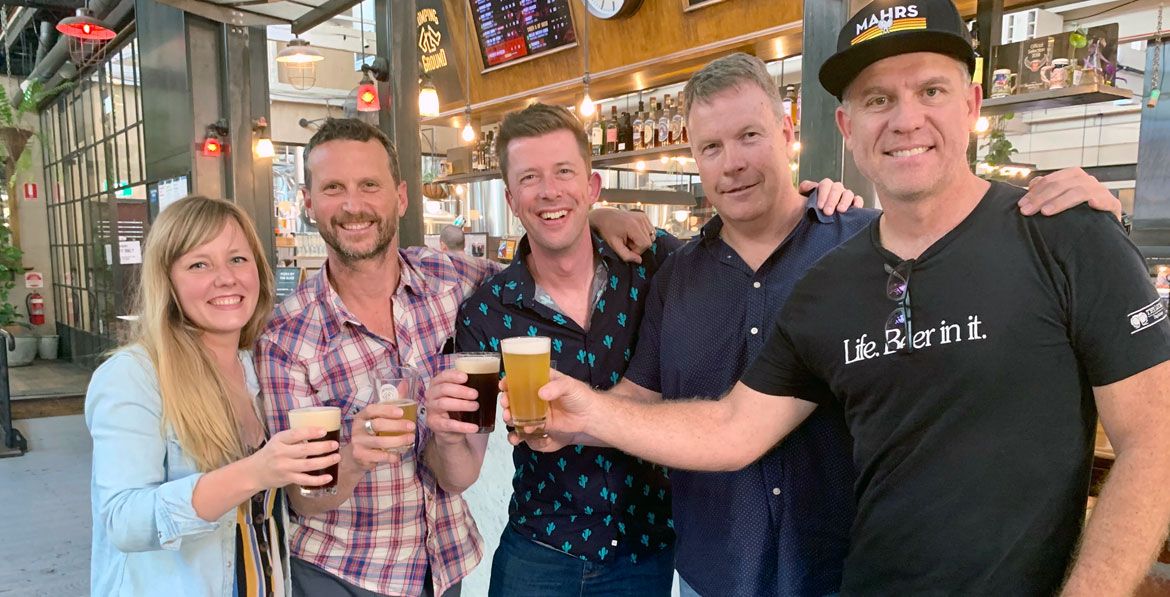
We opened GABS 2020 tickets sales on March 11 and had a record 24 hours of sales, then, like all in the industry, our world came to a grinding halt.
GABS has always been about supporting craft brewers and providing the industry with a platform to engage directly with consumers. We used this opportunity to connect and have a virtual beer with as many brewers as possible, and share that experience with our audience, whilst encouraging craft beer lovers to continue their beer journey at home.
We're hoping for a sensible approach to getting back to normal trading through spring/summer. COVID-19 is not going anywhere fast and we need to learn to co-exist with it as we do with so many other ugly diseases.
This may buck the trend but over time we think the craft beer industry will be stronger than ever. I don’t think we have ever seen a period where breweries have dropped so many new beers in such a short timeframe. The "sense of adventure" boundaries have been pushed to the limit and this will broaden the consumer base in the new normal.
We have also been forced to secure new distribution channels which will mean a broadened reach once on-consumption taps come back to pre-COVID-19 levels.
Mike Bray became the new owner of the GABS Festival and Hottest 100 poll in late 2019.
As part of the #keepinglocalalive campaign we're running Postcards from the Edge stories, highlighting the ways in which people are adapting to survive. If you've got a story you think is suitable – or have something to add to the campaign resources online – get in touch.





